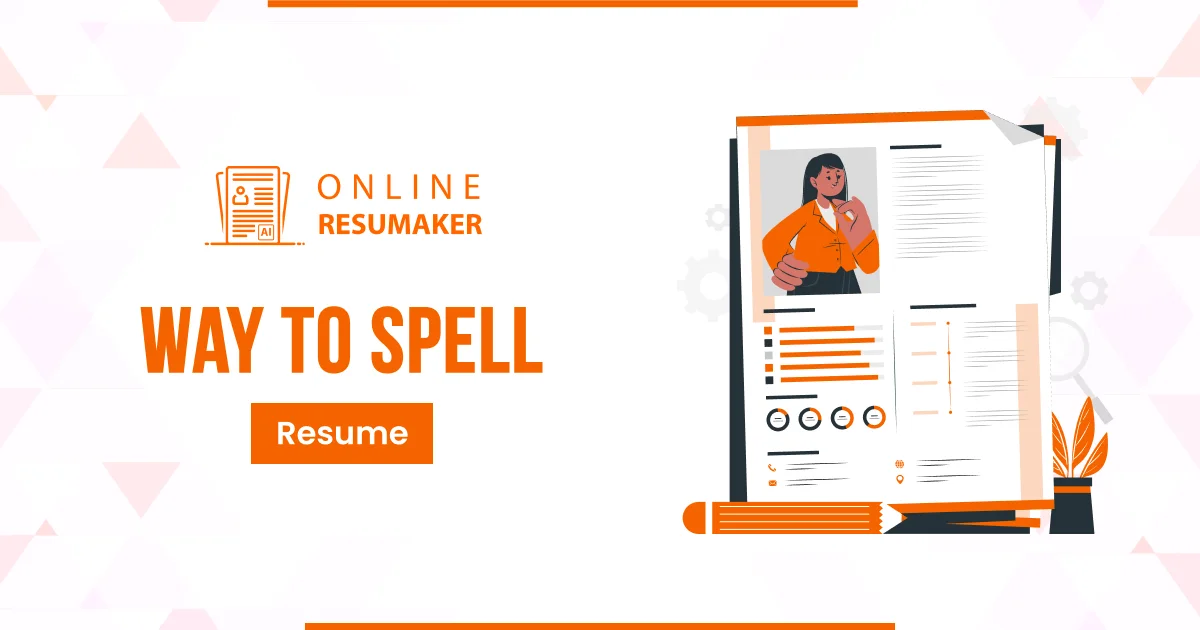A resume is a formal document that a job applicant creates to analyze their qualifications for a position. A summary is usually attained by a customized cover letter in which the applicant expresses an interest in a specific job or company and draws attention to the most relevant specifics on the resume.
American job coaches say that a resume should be only one page in length. British job applicants are expected to produce a more detailed document called a CV (curriculum vitae).
The spelling of "resume" can indeed be a source of confusion, given the various ways it can be written with or without accents.
How to Write and Spell Resume:
Resume (No Accents): In English, particularly in the United States, it is common to see "resume" without any accents. This version is widely accepted and used in American English.
Resume(Two Accents): This is the French spelling, with two accents over the letter' e.' It is the original French word meaning "summary" or "summary of one's career." While this is the correct French spelling, it is also accepted in English, particularly when discussing an overview of a person's training and professional background.
Resume' (One Accent): Some people use one accent, particularly to differentiate the English version from the French one, while still acknowledging the word's French origin. However, this spelling is less common and can look awkward to some readers.
In general, using "resume" without accents is perfectly acceptable in English. If you prefer a more internationally oriented look, you can use "resume" with two accents.
The key is to be consistent in your usage throughout a document. Choose the form that aligns with your preferences and the expectations of your audience.
Choosing the Right Term(Resume, Re'sume, or Resume")
There are three ways to spell the word for a short document summarizing job qualifications: resume, re'sume, or resume". Resume is considered less acceptable. Whether you stick to a resume or resume, or resume, with accents, is a French word for "summary."
In the U.S. and Canada, "resume" is commonly used. More often, it is also called a CV. "Resume" can also be a verb that means to start again. Accents in "resume" prevent confusions.
English accents are difficult to use; borrowed words frequently lose them. For instance, the term "cafeteria" originates from the unaccented Spanish cafeteria. But we keep the Accent in "resume" (wine) to distinguish it. To sum up, both my resume and resume are right. "Resume" is usually used in the U.S. and Canada, while "resume" keeps the French form.
Learn the Art of Resume Spelling
The spelling of "resume" can be different. Dictionaries say both "resume" and "resume" are right. The Associated Press Stylebook likes "resume," while Chicago prefers "resume" with accents. You can pick either; both are okay.
In Canada, where French is official, words like cafe' and "resume" often keep accents in English. You don't need to use "resume" on your actual resume; even your cover letter can mention the attached resume.
Accented Letters: Keyboard Shortcuts
If you've decided to go with the accented spelling of "resume," these practical tips will prove handy when you need to type it.
- Unicode: ALT + 0233 = A'
- Mac: (Option key + e) + e = A'
- Word: CTRL + ' (apostrophe) + e = A'
- Google Docs: Insert -> Special Characters -> Latin -> A'
Grammar Check Tip:
For a simple way, type "resume" and choose your favorite replacement from the software's suggested fixes.
Speaking of simplicity, if you're currently working on your resume (or resume), explore our collection of professional resume templates. Unlike accents, you can't go wrong with one of these!
Enhanced Resources Guide Resume:
Now that we've detailed the optimal ways to spell "resume," let's tailor your resume-building journey, especially if you're a beginner, seeking a refresher, or have no prior experience.
Explore the following resources for personalized guidance:
#1- Guide to Resume Writing for Beginners:
This comprehensive guide provides step-by-step instructions, perfect for those just starting their professional journey.
#2- Resume Writing for Career Refreshers:
If you're returning to the workforce or considering a career change, this article offers tips and tricks to strengthen your resume.
#3- Creating a Resume with No Experience:
For those entering the job market without prior experience, this resource provides invaluable insights on how to present your skills and potential effectively.
#4- Powerful Resume Action Verbs:
Regardless of your experience level, words matter. Action verbs and power words will help you build your resume content strong and effective.
#5- The Jobseeker's Journey- Beginner's Edition:
This e-book is for beginners, guiding you through the job search process and offering tips on how to excel in interviews, even with limited experience.
Feel free to utilize these resources based on your unique background, whether you're just starting or seeking a fresh start in your career journey!
Key takeaways
The word can be spelt as "resume," "resume," or "resume." The term "resume" aligns most closely with its French origins. For more than one, it's simply "resumes."
FAQs:
Q1: How do I type a resume with an accent in a word?
Use the "Insert" tab, select "Symbol," and choose the accented letter. Alternatively, use keyboard shortcuts like Ctrl +' (apostrophe) for e'.
Q2: What should I avoid including in my resume?
Avoid irrelevant details and focus on job-related information. Skip personal info like age and use a professional email address.
Q3: What is the most attractive resume?
The chronological format (also known as the reverse chronological) is the most popular resume format and emphasizes work history.
Q4: How long is a CV?
CVs differ from resumes in their length and content. CVs are 2-to-4 pages for a new professional and a maximum of 10 pages for an experienced professional.










